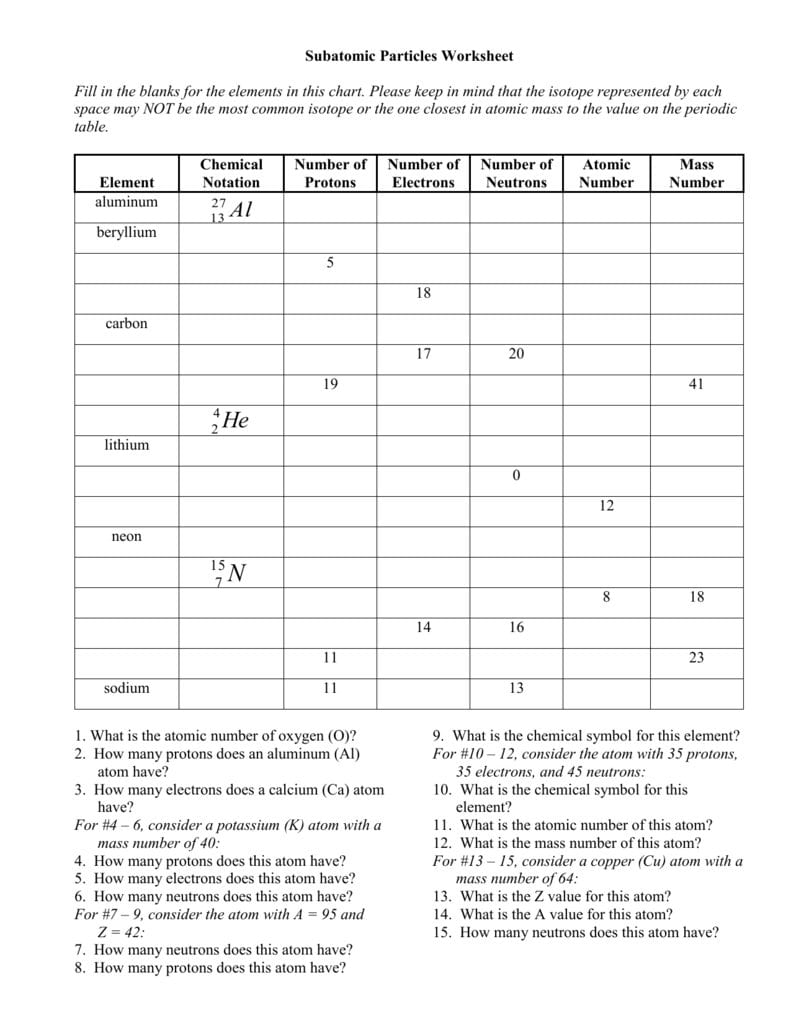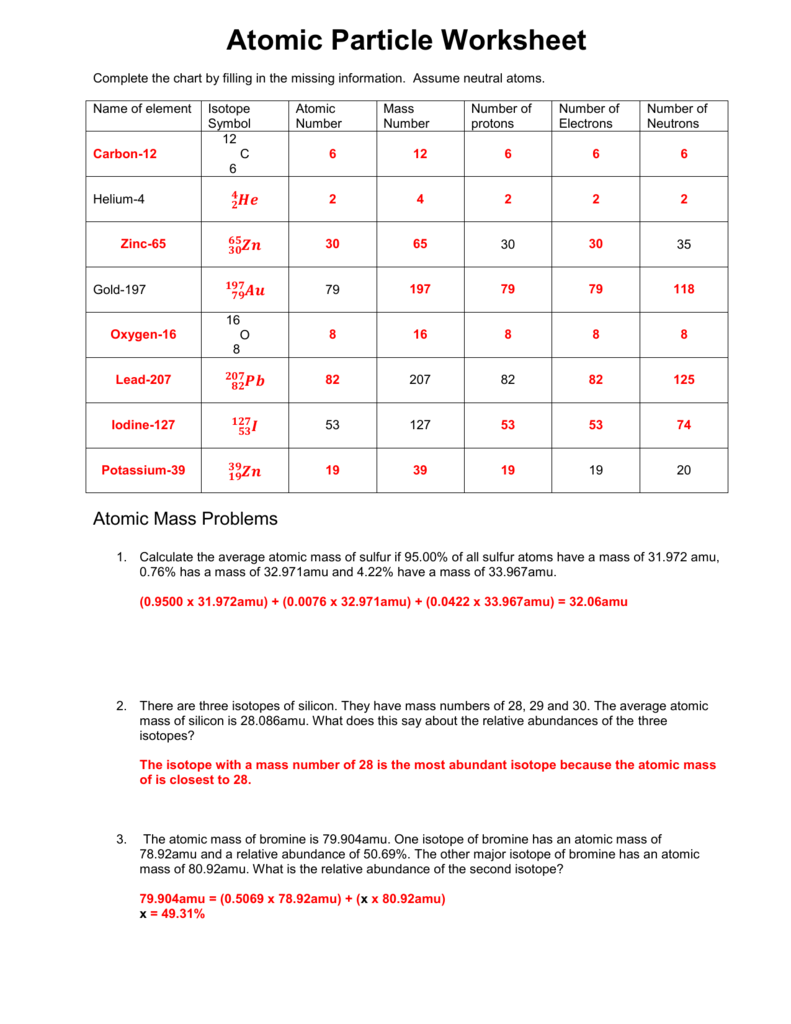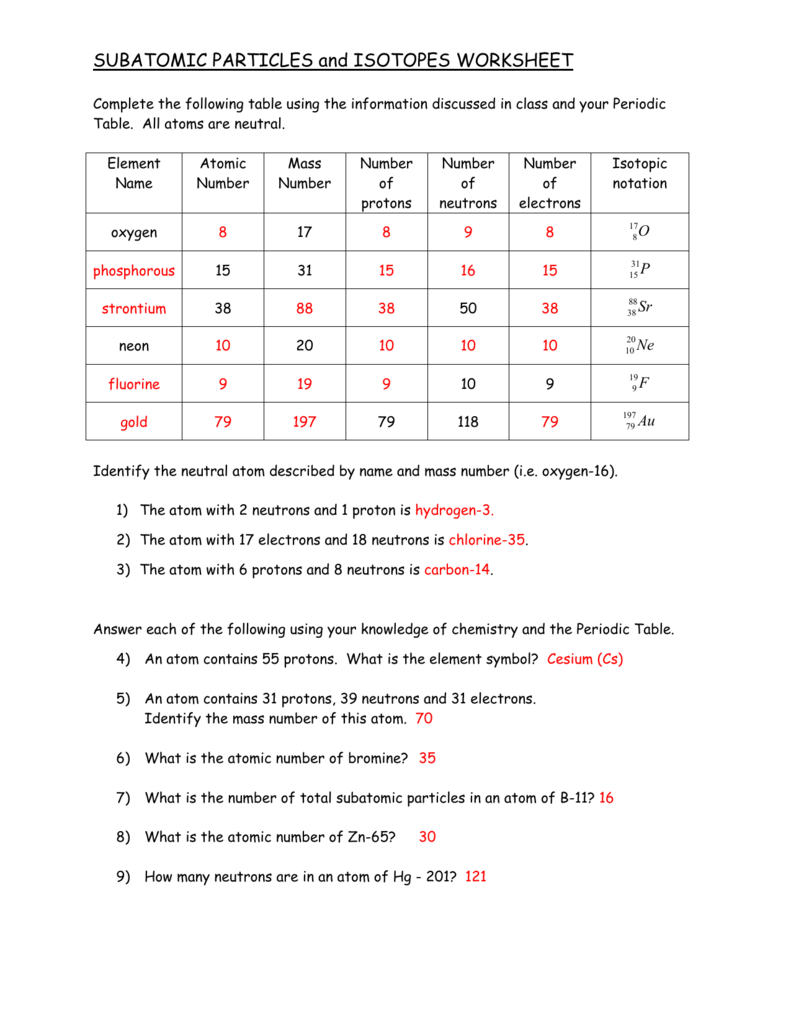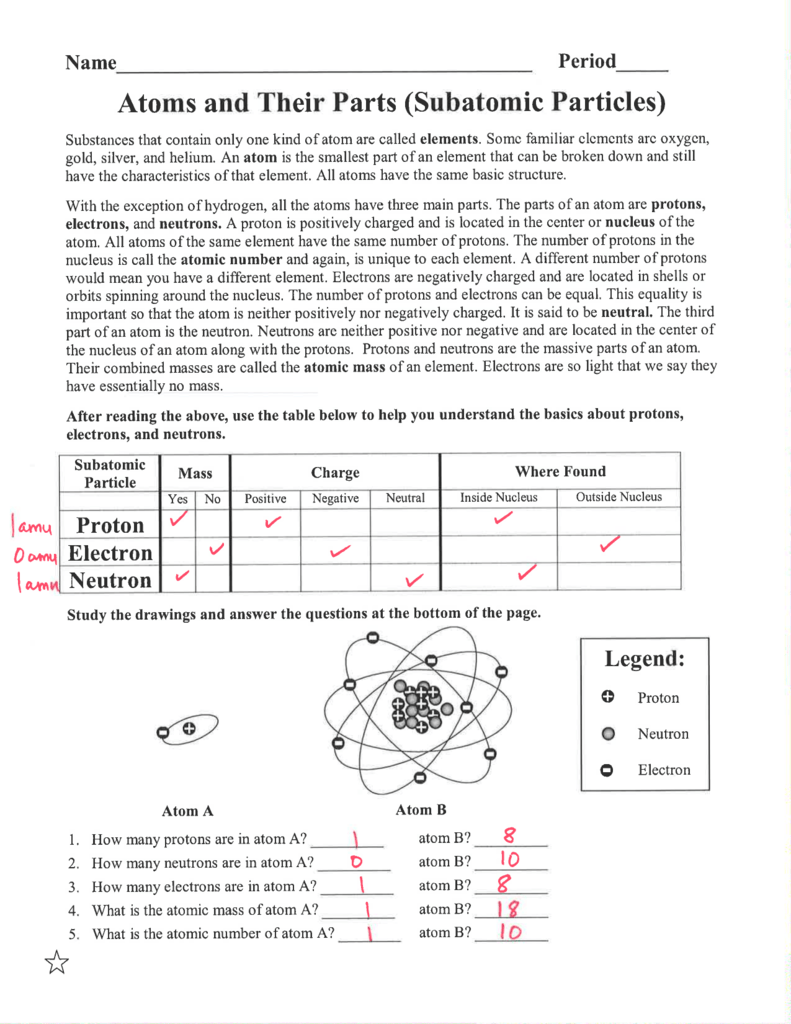Subatomic Particles And Isotopes Worksheet
Subatomic Particles And Isotopes Worksheet - Become familiar with the periodic table I can use the atomic number of an element to identify protons and electrons for any element i can apply the relationship, “mass number = protons + neutrons,” to find protons, neutrons, or mass for any element Web in this molecules worksheet, students review the parts of an atom and use element mass to determine isotopes. Web this chemistry worksheet will help students practice how to identify ions versus isotopes by asking for the element, isotopic notation, mass number, atomic number and the number of subatomic particles (protons, neutrons and electrons) in a neutral atom and in charged ions using the clues provided. The subatomic particle with no electrical charge is the 2. Atoms of an element that contain different numbers of neutrons are called isotopes. Find the three elements shown in model 1 on your periodic table. Web subatomic particles, isotopes worksheet walkthrough Each isotope of a given element has the same atomic number but a different mass number ( a ), which is the sum of the numbers of protons and neutrons. Where is most of the mass of an atom located? Web isotope practice worksheet name: The centre of an atom is a nucleus that contains protons and neutrons. What contribution did these scientists make to atomic models of the atom? I can use the atomic number of an element to identify protons and electrons for any element i can apply the relationship, “mass number = protons + neutrons,” to find. Use the periodic table to identify and count subatomic particles within the atom. Web in this molecules worksheet, students review the parts of an atom and use element mass to determine isotopes. The centre of an atom is a nucleus that contains protons and neutrons. Understand the relationship between the masses of isotopes and the atomic weight of an element;. Web in this molecules worksheet, students review the parts of an atom and use element mass to determine isotopes. Become familiar with the periodic table Complete the table in model 1 by counting the protons and neutrons in each atomic diagram. The subatomic particle with a positive charge is the 3. Use the periodic table to identify and count subatomic. It is suitable for classes introducing the topic of calculating protons, neutrons, and electrons (including ions and isotopes). Visual guide to ion formation. If it is an ion, students must indicate the. Students give the group, period, and classification for the given elements. Web subatomic particles and isotopes worksheet complete the following table using the information discussed in class and. Web build an atom out of protons, neutrons, and electrons, and see how the element, charge, and mass change. If it is an ion, students must indicate the. Web learning objectives know the basics of the experiments involving the discoveries of the three subatomic particles memorize relative charge values and amu masses of the three subatomic particles. Students give the. Where is most of the mass of an atom located? Web subatomic particles and isotopes worksheet complete the following table using the information discussed in class and your periodic table. Web neutral atoms have the same number of electrons and protons. 0 ratings 0% found this document useful (0 votes) 7 views. Describe the general arrangement of subatomic particles in. Understand the relationship between the masses of isotopes and the atomic weight of an element; If it is an ion, students must indicate the. Web subatomic particles and isotopes worksheet complete the following table using the information discussed in class and your periodic table. Web understand the structure of atoms, isotopes, and ions; Web in this molecules worksheet, students review. This worksheet has 6 short answer questions and 17. Web sub atomic particles and isotopes. Where is most of the mass of an atom located? Web this lesson enables the students to recall atomic structure and apply information to learn about isotopes. Web this chemistry worksheet will help students practice how to identify ions versus isotopes by asking for the. Identifying and locating the subatomic particles The worksheet includes 26 bohr models for elements up to atomic number 30. Visual guide to ion formation. Web put the correct answer in the space provided (you will need a periodic table): Web understand the structure of atoms, isotopes, and ions; Fill in the table with the correct information. The subatomic particle with no electrical charge is the 2. Atoms of an element that contain different numbers of neutrons are called isotopes. Become familiar with the periodic table The worksheet includes 26 bohr models for elements up to atomic number 30. Students give the group, period, and classification for the given elements. Each isotope of a given element has the same atomic number but a different mass number ( a ), which is the sum of the numbers of protons and neutrons. It is suitable for classes introducing the topic of calculating protons, neutrons, and electrons (including ions and isotopes). In this atomic structure modeling activity, students practice drawing bohr models and calculating subatomic particles for neutral atoms, isotopes and charged atoms. Visual guide to ion formation. Describe the location of the proton, electron, and neutron inside the atomic model. The subatomic particle with a positive charge is the 3. The worksheet includes 26 bohr models for elements up to atomic number 30. Web this is a worksheet to help students practice calculating subatomic particles. What is the atomic number of oxygen (o)? Web subatomic particles, isotopes worksheet walkthrough Web learning objectives know the basics of the experiments involving the discoveries of the three subatomic particles memorize relative charge values and amu masses of the three subatomic particles. Element name atomic number mass number number of protons number of neutrons number of electrons isotopic notation oxygen 17 15 31 38 50 neon 20 10 9 79 118 Introduction and practice questions for relative atomic mass based around chlorine. Then play a game to test your ideas! Find the three elements shown in model 1 on your periodic table. What subatomic particles do the following symbols represent? Element name atomic number mass number number of protons number of neutrons number of electrons isotopic notation oxygen 17 15 31 38 50 neon 20 10 9 79 118 Become familiar with the periodic table The subatomic particle with a negative charge is the 4. Web put the correct answer in the space provided (you will need a periodic table): If it is an ion, students must indicate the. In this atomic structure modeling activity, students practice drawing bohr models and calculating subatomic particles for neutral atoms, isotopes and charged atoms. Worksheet included for calculating subatomic particles with given data. Introduction and practice questions for relative atomic mass based around chlorine. Worksheets are atoms subatomic particles the periodic table, atoms family work, particles atoms molecules and ions, fundamental particles fundamental questions, subatomic particles ions and bonds, atomic particles atoms isotopes and bonding work pdf, the chemistry of life. Web understand the structure of atoms, isotopes, and ions; Become familiar with the periodic table The worksheet includes 26 bohr models for elements up to atomic number 30. Describe the location of the proton, electron, and neutron inside the atomic model. Web this chemistry worksheet will help students practice how to identify ions versus isotopes by asking for the element, isotopic notation, mass number, atomic number and the number of subatomic particles (protons, neutrons and electrons) in a neutral atom and in charged ions using the clues provided. Element name atomic number mass number number of protons number of neutrons number of electrons isotopic notation oxygen 17 15 31 38 50 neon 20 10 9 79 118 The subatomic particle with a negative charge is the 4. The centre of an atom is a nucleus that contains protons and neutrons. Web this lesson enables the students to recall atomic structure and apply information to learn about isotopes. I can use the atomic number of an element to identify protons and electrons for any element i can apply the relationship, “mass number = protons + neutrons,” to find protons, neutrons, or mass for any elementworksheet on subatomic particles answers
️Subatomic Particles Worksheet Free Download Goodimg.co
Isotope Practice Worksheet Answers Lovely Protons Neutrons and
Subatomic Particles Worksheets
4.25 Packet Key
Subatomic Particles And Isotopes Worksheets Answers Chemistry
Isotope Practice Worksheet Cohomemade
Atomic Structure Worksheet Answer Key Chemistry Lab Tripmart
Solved PAGE C PARTICLES and ISOTOPES WORKSHEET Table, All
worksheet. Parts Of The Atom Worksheet. Grass Fedjp Worksheet Study Site
The Subatomic Particle With A Positive Charge Is The 3.
Web Isotope Practice Worksheet Name:
Web Subatomic Particles And Isotopes Worksheet Complete The Following Table Using The Information Discussed In Class And Your Periodic Table.
Find The Three Elements Shown In Model 1 On Your Periodic Table.
Related Post:










